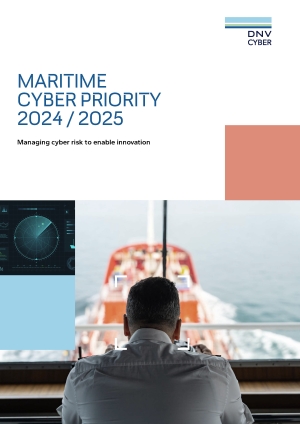


(Posted on 20/11/24)
A new report published by DNV reveals that the majority (61%) of maritime professionals believe the industry should accept increased cyber risk from digitalization if it enables innovation and new technologies. The sector’s appetite to take on emerging risks arising from digital transformation is notably higher than other critical infrastructure industries including energy, manufacturing and healthcare.
The industry’s increasing appetite for cyber risk comes at a time when it must manage a growing volume of vulnerabilities. Seven in 10 (71%) of the almost 500 maritime professionals surveyed by DNV believe their organizations’ industrial assets are more vulnerable to cyber-attacks than ever before, while the same proportion (71%) say the leaders of their organizations consider cyber security to be the greatest risk their business faces.
“In the maritime industry, we must match our ambitions for digital transformation and decarbonization with a steadfast commitment to securing our people, the vessels and the systems we rely on,” says Knut Ørbeck-Nilssen, CEO Maritime at DNV. “Cyber-attacks represent a growing threat to the safety of the maritime industry today. We can innovate, progress, and take a lead in ensuring the resilience of our businesses and societies, but only if we truly manage cyber risk.”
Ship owners, ports, and the entire maritime value chain are increasingly reliant on ever more connected digital technologies as the industry transforms to become greener, safer, and more efficient. Maritime professionals point to advanced data analytics, the internet of things, AI & machine learning, high-bandwidth satellite communications, and autonomous operations as presenting the greatest opportunities for their businesses in the coming years.
While interconnectivity and new technologies bring opportunities, they also make the industry more vulnerable to cyber-attacks. Maritime professionals are confident the industry is managing the risk. More than eight in 10 (83%) say their organization has a good cyber security posture, and seven in 10 (71%) are confident their organization would quickly get back to business as normal following a cyber-attack.
Contributing to this confidence, almost three quarters of maritime professionals (73%) report that their organization is increasing cybersecurity spending compared to last year. A majority say their organization has prepared against potential outcomes such as asset downtime and disruption to operations, theft of sensitive data, physical injury or loss of life, and a grounded vessel.
While industry awareness of cyber risk and cybersecurity investment have grown rapidly, there are signs of a false sense of security within the maritime industry. Only half (53%) of those surveyed are confident their organization can demonstrate full visibility of supply chain vulnerabilities, a concern given the recent rise in cyber-attacks targeting supply chains.
Inchcape Shipping Services (ISS), a global leader in port agency and marine services, has announced... Read more
NORDEN have confirm that they have sold two vessels from their owned fleet, one Capesize vessel and... Read more
Pacific Basin Shipping Limited, one of the world’s leading dry bulk shipping companies, has entered... Read more
AtoB@C Shipping, a subsidiary of ESL Shipping, has announced the successful delivery of Fleximar, the... Read more
Western Bulk, together with reputable Norwegian partners A/S J. Ludwig Mowinckels Rederi, Premium Maritime... Read more
Pacific Basin Shipping Limited, one of the world’s leading dry bulk shipping companies, has announced... Read more
Columbia Group anticipates a period of strong expansion as an increasing number of international shipowners... Read more
Norse?Ship Management has expanded its use of Smart Ship Hub’s high frequency sensor data and... Read more
As the maritime industry gears up to welcome the IMO’s STCW bullying and harassment training amendments... Read more
NORDEN has acquired the cargo activities of Taylor Maritime in Southern Africa (previously operated... Read more